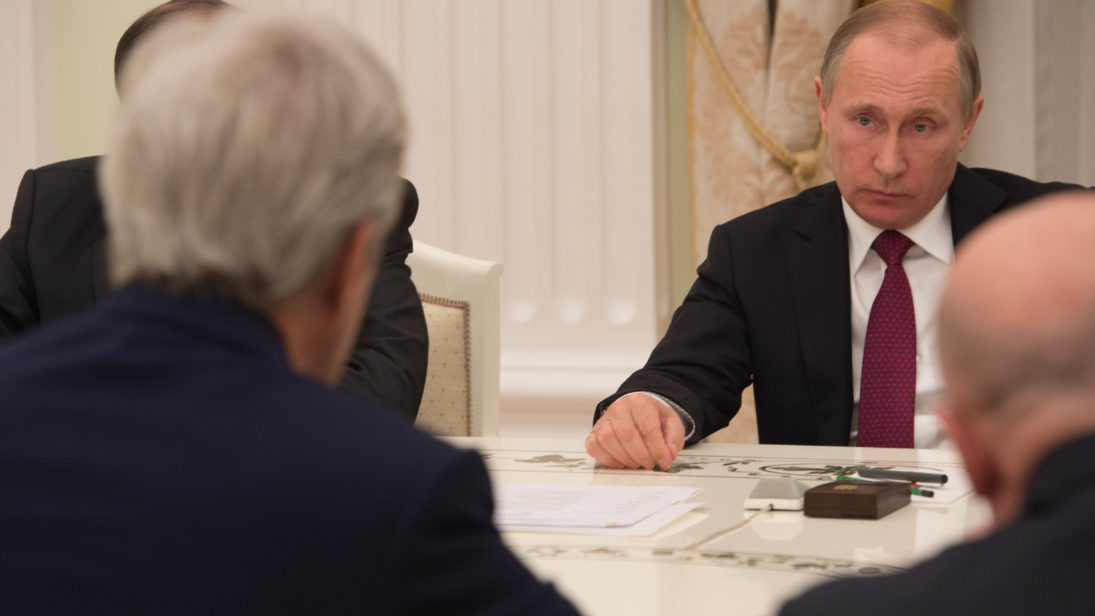
Russia under the leadership of Vladmir Putin is a re-emerging power, at both the regional and global level. It may not be where it was at the peak of the Cold War, but it is certainly influencing global affairs immensely. Its revival can be especially observed in the developments of Ukraine and Syria. Thus, Russia seems to be aspiring for regional hegemony in Eastern Europe and Central Asia. But Russia’s recent overtures to Pakistan and its entente with China, especially in the face of increasing Indo-U.S. closeness, may also affect the dynamics of South Asia.
Regional Hegemony Theory
A regional hegemon’s relationship with its neighbors is analogous to that of a global hegemon’s with other states of the world. John Mearsheimer argued that the anarchical state of the world system, uncertainty about other’s intentions, and the need for survival, lead a state to strive for regional hegemony. Mearsheimer holds the view that global hegemony is unattainable, thus a state will try to achieve regional dominance instead, by influencing the affairs and policies of its neighbors.
In the 1990s, Russia emerged as the most powerful of the former Soviet states, mainly because of its size and military strength. Consequently, it was a regional hegemon in Central Asia. It maintained tremendous influence in the region by trying to control natural resources such as oil, which in many cases had to pass through Russian territory for export to other states.
Russia did not play a significant role in global politics for almost two decades, but that has begun to change in the recent past. First, it was the issue of Ukraine, which shares its border with Russia. Russia challenged the European security order by invading eastern Ukraine and annexing Crimea. Although this was condemned by NATO and the United States, Washington has seemingly been unable to craft a policy to deter continued Russian aggression.
Second is the ongoing Syrian issue, with Russia on the side of the Syrian dictator Assad, and the United States supporting the rebels. Putin has recently started airstrikes against the Syrian rebels, an action about which American officials have serious apprehensions. Furthermore, intelligence suggests that Russia is establishing an army base on Syrian territory, sending a clear, offensive message to United States.
Russian emergence and potential implications for South Asia
Russia is now turning its gaze to South Asia. Islamabad and Moscow are increasing both military and economic relations, in the wake of changing regional and global politics. They have signed a deal whereby Russia will sell Mi-35 helicopters to Pakistan. Furthermore, a gas pipeline deal between Lahore and Karachi of $2 billion is another sign of growing relations between both states. There is also speculation that Pakistan may make Russia a part of the China-Pakistan Economic Corridor. These developments are critical, especially considering Russia and Pakistan’s past relationship, and how Russia has traditionally been close to Pakistani’s archrival and immediate neighbor, India.
Russia also has close ties with China, in both economic and strategic spheres. Putin has dismissed the idea of an eastern alliance, and declared: “We are not creating a military alliance with China.” However, despite this statement, the neighbors enjoy immensely positive relations, working together on both regional and global affairs. In May this year, Russia ratified an agreement for gas supply to China. On the strategic front, both countries signaled their intentions when they conducted a joint naval exercise in the Mediterranean Sea this May. Putin also attended the Chinese military parade on the occasion of the 70th anniversary of Japan’s surrender during World War II. The relationship is mostly based on anti-Western policies. On global issues like Syria, both states are in the same camp, countering U.S. strategies and offense in the region.
Relations with Iran are also mainly based on anti-U.S. sentiments. Although cooperation between Russia and the United States to apply sanctions on Iran was a major factor in finalizing the nuclear deal with Iran, the Islamic regime sees Putin as an ally. They engaged in joint military exercises this year, when three Iranian warships reached Moscow. Furthermore, Iran and Russia also have the same stance on Syria, in being pro-Assad.
Conclusion
Russia is definitely re-emerging as a strong contender to challenge U.S. authority in global affairs. Spending almost two decades in isolation with regard to strategic and military issues, Russia is now regaining lost ground. Although it will take time for Russia to be a more powerful actor in the international arena, it is exhibiting regional hegemony in Central Asia. The implication for South Asia is that Pakistan, through its relationships with China and Russia, may be able to tackle Indian aggression more effectively, despite growing Indo-US relations. Thus, Russia’s role in South Asia is one to watch.
***


